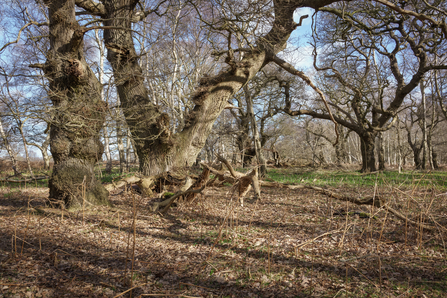
Captain's Wood by Steve Aylward

Captain's Wood by Steve Aylward
The Natural Capital Committee (NCC) has published its views on what the Government's 25 year environment plan should contain.
The NCC makes clear that the scale of the task is huge if we are to leave the natural environment in a better state than we found it.
It is widely acknowledged that the UK is overdrawn on its 'environmental bank balance' and that we have built up a huge deficit which we need to pay off. We've taken and used the natural resources on which we depend at a faster rate than they can be renewed.
The most serious consequence of the way we have mistreated the natural environment is the well-documented and desperate loss of wildlife and wild places. Our ancient woodlands, heaths, bogs, wetlands and undersea habitats are continuing to be lost to inappropriate development despite the protections that they are supposed to enjoy. Sites of Special Scientific Interest and other hugely important wild areas are threatened by HS2 – potentially 500 wildlife sites will be affected directly and indirectly along this new train route - and by other projects such as a new motorway across the Gwent Levels. The uplands on which we depend for clean water, carbon storage and flood control are degraded. More than a quarter of British birds are on the ‘red list’ of species under conservation concern including curlew, nightingale and puffin.
Thus, the need is great. In response, the NCC has produced a comprehensive and well thought-through package of measures which strike at many of the causes of the problems.
This report is a breath of fresh air for those of us who care passionately about the natural world. We are a part of nature - and everything we need comes from it. So getting this right is critically important if, like me, you care deeply about the future health and happiness of humanity.
The NCC report presents evidence-based solutions that can, and will, help solve some of the most pressing problems of our time.
I can almost entirely support the bulk of the Committee's proposals around:
- defining a bold and ambitious vision
- the scale and urgency of activities and investments required
- the need for long term targets and intermediate milestones
- the need for new environmental governance and structures
- improving access to nature near to where people live
- ensuring that all activities generate net gain for the environment.
It’s wonderful to see the ideas for creating 250,000 hectares of new woodland - if they're in the right places and focussed on natural regeneration. Getting our remaining peat bogs into healthy condition must be an important national priority – as is doubling the levels of organic matter on arable land. But every ecosystem should be addressed - Government's indices for the natural environment need to aim higher than internationally agreed goals like ensuring a minimum of 17% of land managed for conservation.
The need for an integrated and spatial approach based on natural capital principles is fundamental on land and at sea. On land we need to go beyond traditional town and country planning if we are to achieve nature’s recovery, planning sub-nationally in England and at country levels, mapping protected areas (including local wildlife sites) as well as Nature Improvement Areas as part of a wider wildlife network. At sea we should be proactively planning in each of the six or so regional seas around the UK for areas that are protected from damaging activities, areas suitable for energy development, areas suitable for fishing etc. We can only really integrate our decisions about all these different uses by looking at a spatial scale. We can only restore our natural capital in this way.
The NCC advice is excellent and the Government need to inject urgency into its 25 year plan. Greater investment will be needed from the private sector in rebuilding our reserves of natural capital and public funding will also need to be directed at these outcomes, targeted through mapping. The report should also emphasise the importance of proportionate but effective regulation and enforcement - alongside the framework of policy instruments and incentives.
One of the most critical points mentioned in the report, albeit rather quietly at the back, is the need for the 25 year plan to be underpinned by new legislation. Only an Environment Act will ensure that the plan will endure and deliver real change for the next 25 years – having a life beyond rotating governments and ephemeral ministerial appointments. It's also vital for government departments to work together for common purpose. Legally binding goals and positive spatial planning at a sub-national level are a great way of getting the join-up across Government that we need to achieve the vision.
Now is the time for Michael Gove to leave an indelible mark and define his political legacy - by creating the conditions for nature's recovery so that for the first time ever, we can genuinely leave the natural world in a better state than we inherited it. The NCC's recommendations should be implemented in full, augmented as we suggest above, and guaranteed by a visionary new Environment Act.
Stephen Trotter is Director England and Living Landscapes for The Wildlife Trusts